-
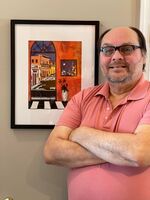 Interview with Javier Toro
Interview with Javier Toro Javier Toro was born and raised in the town of Utuado, Puerto Rico. Javier Toro's passion for history was fostered by Dr. Pedro Hernandez, who was a dentist by profession and a self-taught historian. He describes his former employment in Puerto Rico as a librero and assistant manager of a bookstore as being the most rewarding job he ever had because it granted him the opportunity to meet international writers, including Noble Prize-winning Peruvian author Jorge Mario Pedro Vargas Llosa, Chilean author José Donoso Yáñez, and prominent Peruvian author Alfredo Bryce Echenique. When he was working in a factory where t-shirts are printed and when he worked in banking his commitment to the community was constrained to lack of spare time. After earning a position at the South Bethlehem Neighborhood Center, Javier Toro was able to practice his passion and love for his community in a full-time capacity. Javier Toro also contributed to the Bethlehem Steel Workers Archive, by reaching out to the former Hispanic/Latinx employees of Bethlehem Steel.
The town of Utuado is located in the central part of the island. Javier Toro's hometown is not small in terms of the territory because it is the third-largest in Puerto Rico. The population of Utuado is approximately 35,000 residents. By the end of the nineteenth century, the population was approximately 90,000 because of coffee production in the area. His family came from the Barrio Caguana, sprawled from one of the urbanizaciónes near the town. Javier Toro’s brothers settled in New Jersey and in the Lehigh Valley. Javier Toro studied at Universidad Interamericana, the Center for Advanced Studies of Puerto Rico and the Caribbean (Centro de Estudios Avanzados de Puerto Rico y el Caribe), and Lehigh University. Javier Toro’s wife studied at the University of Puerto Rico, Río Piedras Campus.
-
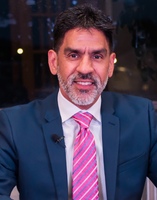 Interview with Jose Rosado
Interview with Jose Rosado Jose Rosado begins his interview with a description of his happy childhood in public housing. He mentions going to school at Freedom High School his alma maters: East Stroudsburg University and Lehigh University. He worked as a counselor at Liberty High School and found that a reform on how we are addressing drug addiction to be worth exploring because of the mass incarceration that had adverse effects on the community. He illustrates the devastation drugs inflicted upon the community after soldiers, many of which had a heroin addiction, returned from the fighting in war, and the crack epidemic in the 1980s.
Jose Rosado gives highlights of his book titled Being Good At Being Bad: Troubled Teenagers Factors and Solutions. He shared that he had adopted and overcome life-limiting behaviors ranging from drug addiction to alcoholism and shares his personal story of going from a happy child to an angry teenager, which as a probation officer and later as a high school counselor, made him well equipped to assist youth in their transitions out of conformity with subculture expectations. He is hopeful for the future of the Lehigh Valley since constructive dialogue is emerging to assess paths forward on issues ranging from police brutality, racism, school curriculum, and drug use. He shares some of the tough decisions he had to make while serving as the first Latino Mayor in Fountain Hill, within the Commonwealth of Pennsylvania.
-
 Interview with Dr. Vivian Robledo
Interview with Dr. Vivian Robledo Dr. Vivian Robledo began her studies at East Stroudsburg University, earning her Bachelor’s in Economics. She worked as a public health contractor focusing on AIDS/HIV and in minority recruitment for East Stroudsburg University admissions. It was through this role where she found her vocation: counseling and providing students with the skills of self-advocacy. She served as the principal of the Alternative School/Career Academy and as the Assistant Principal of the Liberty High School.
She furthered her studies at NYU and later enrolled into a fast-track program for aspiring school principals at Indiana University, thanks to Iris Cintron’s advice. Iris Cintron was the one that called her and convinced her to return to Bethlehem from New York to work in Broughal Middle School. She describes Iris Cintrón as being more than a mentor for her, but rather a sponsor. She acknowledges that she stands on the shoulders of many female giants that came before her and has found profound meaningful purpose in every role she assumed, whether as a step team coach, volleyball coach, and as the Director of Student Services and Minority Affairs through Bethlehem Area School District, because it meant having a positive impact on her extended family (the community at large). She shares her concerns around gentrification on the South Side, discrimination for speaking other languages that are not English, prejudice, racial slurs, and microaggressions.
-
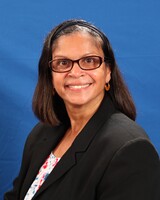 Interview with Councilwoman Olga Negrón
Interview with Councilwoman Olga Negrón Olga Negrón was born and raised in Naranjito, Puerto Rico and had her first child there. Throughout her childhood, Olga admired the military uniform which evolved into a desire to serve. Her father has not in favor of this idea since he had already allowed two children to serve in the military and instead motivated her to focus on going to college. This dream came true when she enrolled in the University of Puerto Rico and pursued her passion for sewing. Olga mentions the rise of the macheteros and independistas in Rio Piedras, Puerto Rico as being a variable to her reluctance to excel at learning the English language, but eventually left Puerto Rico to go to Tallahassee, Florida. It was a difficult time for her because of her lack of proficiency in the English language combined with the norm of segregation, but she persisted. She later moved to Austin, Texas and eventually found her way to the relatively colder climate of the Lehigh Valley, where she worked as a seamstress.
She was invested in the church community which she describes as being an embodiment of the melting pot aspiration, exemplified by masses for English, Spanish, and Portuguese speakers. She became a community organizer for CUNA, which was based on the Pacific Institute for Community Organizing (PICO) model and has made her successful at engaging the community.
Olga relays her experience as not being taken seriously as a member of the Bethlehem City Council and her experiences working for a radio station and a law firm. This law firm gave her the flexibility as an employee to work as a Councilwoman, an interpreter, and a well-respected, trusted community liaison.
-
 Interview with Guillermo Lopez
Interview with Guillermo Lopez Guillermo Lopez's last 10 years of his 27 years career working for Bethlehem Steel was in the role of Joint Civil Rights Representative for the Bethlehem Steel Factory and the Union that represented the workers of Bethlehem Steel. Guillermo Lopez recounts the problems that his parents encountered with their neighbors which once escalated to the point of violence, and how his family was among five other families that put their homes up as collateral to form the Puerto Rican Beneficial Society in Bethlehem, Pennsylvania. Guillermo Lopez recalls the hustle and bustle of the South Side when Bethlehem Steel and the marketplace were in motion. He speaks about the historical ties to the police brutality that happens today and the police brutality against the Puerto Rican community which became the motivation for establishing the Puerto Rican Beneficial Society. The Puerto Rican Beneficial Society was also created to address the problems in their children’s education. In addition, Guillermo speaks on the political impediment to allow the Puerto Rican Beneficial Society relocate from the South Side into the central part of the city near City Hall.
-
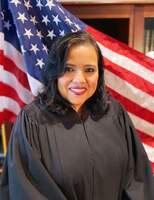 Interview with Nancy Matos Gonzalez
Interview with Nancy Matos Gonzalez Nancy Matos Gonzalez was born in Bethlehem, Pennsylvania. When she was growing up, the Latinx/o community was exclusively in South Bethlehem. She describes her upbringing in a traditional Catholic family in which Holy Infancy Elementary School played an important role. She is thankful for the admirable commitment that Holy Infancy Elementary School demonstrated in providing a Catholic education to the Latinx/o community despite the inability for many members of the community to pay the tuition. She discusses her journey to becoming the first Hispanic district magisterial judge in the Commonwealth of Pennsylvania. She mentions her educators, mentors, and advocates that positively shifted her career path to her current position. This list of important inspirational leaders in her life includes Father Juan, the Iron Lady of Bethlehem, Board Members of the Hispanic Center of the Lehigh Valley, and her campaign manager.
She speaks on how the role of advocacy is imperative for the Latinx community in the Lehigh Valley to have access to hospital translators, social services, and job placement resources and ongoing efforts to promote social mobility, end prejudice, and adjust societal expectations.
-
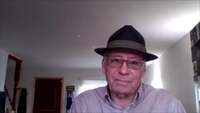 Interview with Ismael García
Interview with Ismael García Ismael was born on November 23, 1928 and was one of seven brothers and sisters and was raised primarily by his hard-working father in Puerto Rico after his mother passed away shortly after giving birth to Ismael and his younger sister. He describes going to school until the 5th grade and working for a widow at 13 years old. At 22 years old, he moved to New Jersey to work on a farm with four friends for six months and then returned to Puerto Rico, but then came to live in Allentown with a friend and cousin in 1952 (about 2 years later). Ismael recounts his time learning English through television and reading the Morning Call. He moved to Bethlehem in 1953, and worked for Bethlehem Steel with those who identified as “Mexican, Spanish, Colored, Portuguese, and American.” He discussed the difficulty of working three shifts, his role as a shop steward, and his role as a representative for the union.
Ismael discusses the last strike in 1959 around health benefits and vacation time, and his trip to Washington, DC to visit OSHA (Occupational Health and Safety Administration) in order to tell them about the working conditions at Bethlehem Steel. Ismael co-founded the Puerto Rico Beneficial Society in 1952 and the Hispanic Center, which at the time was known as the Council for Spanish Speaking Organizations. Ismael addresses a perceived hierarchy in the Latino community, discrimination, and his journey to become a foreman for Coke Works. He discusses creating two Puerto Rican Class A baseball leagues: a church league and tri-county league. Ismael ends the interview by discussing his 31-year retirement, the COVID-19 pandemic, and the future.
Spatial coverage: Puerto Rico, San Juan, Woodbury, New Jersey, farms, hotel, Coke Works, Bethlehem Steel, Allentown, Bethlehem, Washington, DC, 4th Street, Hispanic Center, Northampton Community College (NCC), Easton, South Bethlehem, Moravian College.
-
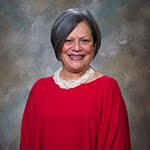 Interview with Maria Teresa Donate Mena
Interview with Maria Teresa Donate Mena Teresa’s passion for higher education is reflected through her role as an admissions director, a counselor, and as a professor emeritus. She shares that a strong sense of community was the primary magnet that brought her to settle in the Lehigh Valley and to work at Northampton Community College. Teresa played an instrumental role in the creation and sustainment of the Northampton Community College’s Hispanic Faculty Caucus, which empowered her to bring forward cultural programming and advocacy initiatives to improve the academic experiences for low-income and non-traditional students, and students were in the naturalization process. Teresa was one of the founders of the Latino Leadership Alliance of the Lehigh Valley, an organization which has had an impact in providing resources for future leaders through scholarships, assistance with college applications, and advocating for accountability what it comes to representation from the Latinx/Hispanic community.
Spatial coverage: Vega Baja, Puerto Rico, Sugar Cane Plantations, Sugar Factory, InterAmerican University, United States of America, Bethlehem, Bethlehem Area School District, Orlando, Florida, Pen Argyl, Nazareth, University of Central Florida, Northampton Community College, Northampton Community College’s Hispanic Caucus, Latino Leadership Alliance of the Lehigh Valley, Liberty High School, Ocean, and Beach.
-
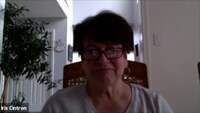 Interview with Iris M. Sanchez de Cintrón
Interview with Iris M. Sanchez de Cintrón Iris M. Sanchez de Cintrón has spent her life as an advocate. She is a hero for the Spanish speaking parents, students, and the community at large due to her efforts reforming the Bethlehem Area School District’s approach to teacher-parent conference follow-ups, the City’s point system for employment with law enforcement and the fire department, and her service within the Puerto Rican Beneficial Society and the Council for Spanish Speaking Organizations. She wishes for future generations to open more doors and seats at decision making tables to secure representation and communication of the communities’ needs. She reflects on the past and says that things are much better than they used to be, but there is room for improvement. She instilled her students with self-confidence so that they can achieve anything they aspire to be, despite society’s adversarial messages.
-
 Interview with Dr. Javier Ávila
Interview with Dr. Javier Ávila Dr. Javier Ávila opens his narrative with a discussion of his childhood in the Metropolitan City of Bayamon, Puerto Rico. He explains his decision-making process of moving to Bethlehem, Pennsylvania, which included the opportunity to work at Northampton Community College.
He shares his parents’ commitment to supporting his unique childhood aspirations and the books around the house which harnessed his love for reading, learning, and writing. In Dr. Javier Ávila's classroom, the education process is a partnership in which mutual honesty is considered an essential component of getting through the educational journey together.
He shares the hustle involved with getting his show from small audiences to larger crowds and comments on the value of comedic release when discussing racism because of the sensitivities attached to it. Dr. Ávila discusses his literature and poetry and emphasizes on the common thread of humanity. He concludes with a call to focus on our commonalities and to make more room for members of the community.
 Interview with Javier Toro Javier Toro was born and raised in the town of Utuado, Puerto Rico. Javier Toro's passion for history was fostered by Dr. Pedro Hernandez, who was a dentist by profession and a self-taught historian. He describes his former employment in Puerto Rico as a librero and assistant manager of a bookstore as being the most rewarding job he ever had because it granted him the opportunity to meet international writers, including Noble Prize-winning Peruvian author Jorge Mario Pedro Vargas Llosa, Chilean author José Donoso Yáñez, and prominent Peruvian author Alfredo Bryce Echenique. When he was working in a factory where t-shirts are printed and when he worked in banking his commitment to the community was constrained to lack of spare time. After earning a position at the South Bethlehem Neighborhood Center, Javier Toro was able to practice his passion and love for his community in a full-time capacity. Javier Toro also contributed to the Bethlehem Steel Workers Archive, by reaching out to the former Hispanic/Latinx employees of Bethlehem Steel. The town of Utuado is located in the central part of the island. Javier Toro's hometown is not small in terms of the territory because it is the third-largest in Puerto Rico. The population of Utuado is approximately 35,000 residents. By the end of the nineteenth century, the population was approximately 90,000 because of coffee production in the area. His family came from the Barrio Caguana, sprawled from one of the urbanizaciónes near the town. Javier Toro’s brothers settled in New Jersey and in the Lehigh Valley. Javier Toro studied at Universidad Interamericana, the Center for Advanced Studies of Puerto Rico and the Caribbean (Centro de Estudios Avanzados de Puerto Rico y el Caribe), and Lehigh University. Javier Toro’s wife studied at the University of Puerto Rico, Río Piedras Campus.
Interview with Javier Toro Javier Toro was born and raised in the town of Utuado, Puerto Rico. Javier Toro's passion for history was fostered by Dr. Pedro Hernandez, who was a dentist by profession and a self-taught historian. He describes his former employment in Puerto Rico as a librero and assistant manager of a bookstore as being the most rewarding job he ever had because it granted him the opportunity to meet international writers, including Noble Prize-winning Peruvian author Jorge Mario Pedro Vargas Llosa, Chilean author José Donoso Yáñez, and prominent Peruvian author Alfredo Bryce Echenique. When he was working in a factory where t-shirts are printed and when he worked in banking his commitment to the community was constrained to lack of spare time. After earning a position at the South Bethlehem Neighborhood Center, Javier Toro was able to practice his passion and love for his community in a full-time capacity. Javier Toro also contributed to the Bethlehem Steel Workers Archive, by reaching out to the former Hispanic/Latinx employees of Bethlehem Steel. The town of Utuado is located in the central part of the island. Javier Toro's hometown is not small in terms of the territory because it is the third-largest in Puerto Rico. The population of Utuado is approximately 35,000 residents. By the end of the nineteenth century, the population was approximately 90,000 because of coffee production in the area. His family came from the Barrio Caguana, sprawled from one of the urbanizaciónes near the town. Javier Toro’s brothers settled in New Jersey and in the Lehigh Valley. Javier Toro studied at Universidad Interamericana, the Center for Advanced Studies of Puerto Rico and the Caribbean (Centro de Estudios Avanzados de Puerto Rico y el Caribe), and Lehigh University. Javier Toro’s wife studied at the University of Puerto Rico, Río Piedras Campus. Interview with Jose Rosado Jose Rosado begins his interview with a description of his happy childhood in public housing. He mentions going to school at Freedom High School his alma maters: East Stroudsburg University and Lehigh University. He worked as a counselor at Liberty High School and found that a reform on how we are addressing drug addiction to be worth exploring because of the mass incarceration that had adverse effects on the community. He illustrates the devastation drugs inflicted upon the community after soldiers, many of which had a heroin addiction, returned from the fighting in war, and the crack epidemic in the 1980s. Jose Rosado gives highlights of his book titled Being Good At Being Bad: Troubled Teenagers Factors and Solutions. He shared that he had adopted and overcome life-limiting behaviors ranging from drug addiction to alcoholism and shares his personal story of going from a happy child to an angry teenager, which as a probation officer and later as a high school counselor, made him well equipped to assist youth in their transitions out of conformity with subculture expectations. He is hopeful for the future of the Lehigh Valley since constructive dialogue is emerging to assess paths forward on issues ranging from police brutality, racism, school curriculum, and drug use. He shares some of the tough decisions he had to make while serving as the first Latino Mayor in Fountain Hill, within the Commonwealth of Pennsylvania.
Interview with Jose Rosado Jose Rosado begins his interview with a description of his happy childhood in public housing. He mentions going to school at Freedom High School his alma maters: East Stroudsburg University and Lehigh University. He worked as a counselor at Liberty High School and found that a reform on how we are addressing drug addiction to be worth exploring because of the mass incarceration that had adverse effects on the community. He illustrates the devastation drugs inflicted upon the community after soldiers, many of which had a heroin addiction, returned from the fighting in war, and the crack epidemic in the 1980s. Jose Rosado gives highlights of his book titled Being Good At Being Bad: Troubled Teenagers Factors and Solutions. He shared that he had adopted and overcome life-limiting behaviors ranging from drug addiction to alcoholism and shares his personal story of going from a happy child to an angry teenager, which as a probation officer and later as a high school counselor, made him well equipped to assist youth in their transitions out of conformity with subculture expectations. He is hopeful for the future of the Lehigh Valley since constructive dialogue is emerging to assess paths forward on issues ranging from police brutality, racism, school curriculum, and drug use. He shares some of the tough decisions he had to make while serving as the first Latino Mayor in Fountain Hill, within the Commonwealth of Pennsylvania. Interview with Dr. Vivian Robledo Dr. Vivian Robledo began her studies at East Stroudsburg University, earning her Bachelor’s in Economics. She worked as a public health contractor focusing on AIDS/HIV and in minority recruitment for East Stroudsburg University admissions. It was through this role where she found her vocation: counseling and providing students with the skills of self-advocacy. She served as the principal of the Alternative School/Career Academy and as the Assistant Principal of the Liberty High School. She furthered her studies at NYU and later enrolled into a fast-track program for aspiring school principals at Indiana University, thanks to Iris Cintron’s advice. Iris Cintron was the one that called her and convinced her to return to Bethlehem from New York to work in Broughal Middle School. She describes Iris Cintrón as being more than a mentor for her, but rather a sponsor. She acknowledges that she stands on the shoulders of many female giants that came before her and has found profound meaningful purpose in every role she assumed, whether as a step team coach, volleyball coach, and as the Director of Student Services and Minority Affairs through Bethlehem Area School District, because it meant having a positive impact on her extended family (the community at large). She shares her concerns around gentrification on the South Side, discrimination for speaking other languages that are not English, prejudice, racial slurs, and microaggressions.
Interview with Dr. Vivian Robledo Dr. Vivian Robledo began her studies at East Stroudsburg University, earning her Bachelor’s in Economics. She worked as a public health contractor focusing on AIDS/HIV and in minority recruitment for East Stroudsburg University admissions. It was through this role where she found her vocation: counseling and providing students with the skills of self-advocacy. She served as the principal of the Alternative School/Career Academy and as the Assistant Principal of the Liberty High School. She furthered her studies at NYU and later enrolled into a fast-track program for aspiring school principals at Indiana University, thanks to Iris Cintron’s advice. Iris Cintron was the one that called her and convinced her to return to Bethlehem from New York to work in Broughal Middle School. She describes Iris Cintrón as being more than a mentor for her, but rather a sponsor. She acknowledges that she stands on the shoulders of many female giants that came before her and has found profound meaningful purpose in every role she assumed, whether as a step team coach, volleyball coach, and as the Director of Student Services and Minority Affairs through Bethlehem Area School District, because it meant having a positive impact on her extended family (the community at large). She shares her concerns around gentrification on the South Side, discrimination for speaking other languages that are not English, prejudice, racial slurs, and microaggressions. Interview with Councilwoman Olga Negrón Olga Negrón was born and raised in Naranjito, Puerto Rico and had her first child there. Throughout her childhood, Olga admired the military uniform which evolved into a desire to serve. Her father has not in favor of this idea since he had already allowed two children to serve in the military and instead motivated her to focus on going to college. This dream came true when she enrolled in the University of Puerto Rico and pursued her passion for sewing. Olga mentions the rise of the macheteros and independistas in Rio Piedras, Puerto Rico as being a variable to her reluctance to excel at learning the English language, but eventually left Puerto Rico to go to Tallahassee, Florida. It was a difficult time for her because of her lack of proficiency in the English language combined with the norm of segregation, but she persisted. She later moved to Austin, Texas and eventually found her way to the relatively colder climate of the Lehigh Valley, where she worked as a seamstress. She was invested in the church community which she describes as being an embodiment of the melting pot aspiration, exemplified by masses for English, Spanish, and Portuguese speakers. She became a community organizer for CUNA, which was based on the Pacific Institute for Community Organizing (PICO) model and has made her successful at engaging the community. Olga relays her experience as not being taken seriously as a member of the Bethlehem City Council and her experiences working for a radio station and a law firm. This law firm gave her the flexibility as an employee to work as a Councilwoman, an interpreter, and a well-respected, trusted community liaison.
Interview with Councilwoman Olga Negrón Olga Negrón was born and raised in Naranjito, Puerto Rico and had her first child there. Throughout her childhood, Olga admired the military uniform which evolved into a desire to serve. Her father has not in favor of this idea since he had already allowed two children to serve in the military and instead motivated her to focus on going to college. This dream came true when she enrolled in the University of Puerto Rico and pursued her passion for sewing. Olga mentions the rise of the macheteros and independistas in Rio Piedras, Puerto Rico as being a variable to her reluctance to excel at learning the English language, but eventually left Puerto Rico to go to Tallahassee, Florida. It was a difficult time for her because of her lack of proficiency in the English language combined with the norm of segregation, but she persisted. She later moved to Austin, Texas and eventually found her way to the relatively colder climate of the Lehigh Valley, where she worked as a seamstress. She was invested in the church community which she describes as being an embodiment of the melting pot aspiration, exemplified by masses for English, Spanish, and Portuguese speakers. She became a community organizer for CUNA, which was based on the Pacific Institute for Community Organizing (PICO) model and has made her successful at engaging the community. Olga relays her experience as not being taken seriously as a member of the Bethlehem City Council and her experiences working for a radio station and a law firm. This law firm gave her the flexibility as an employee to work as a Councilwoman, an interpreter, and a well-respected, trusted community liaison. Interview with Guillermo Lopez Guillermo Lopez's last 10 years of his 27 years career working for Bethlehem Steel was in the role of Joint Civil Rights Representative for the Bethlehem Steel Factory and the Union that represented the workers of Bethlehem Steel. Guillermo Lopez recounts the problems that his parents encountered with their neighbors which once escalated to the point of violence, and how his family was among five other families that put their homes up as collateral to form the Puerto Rican Beneficial Society in Bethlehem, Pennsylvania. Guillermo Lopez recalls the hustle and bustle of the South Side when Bethlehem Steel and the marketplace were in motion. He speaks about the historical ties to the police brutality that happens today and the police brutality against the Puerto Rican community which became the motivation for establishing the Puerto Rican Beneficial Society. The Puerto Rican Beneficial Society was also created to address the problems in their children’s education. In addition, Guillermo speaks on the political impediment to allow the Puerto Rican Beneficial Society relocate from the South Side into the central part of the city near City Hall.
Interview with Guillermo Lopez Guillermo Lopez's last 10 years of his 27 years career working for Bethlehem Steel was in the role of Joint Civil Rights Representative for the Bethlehem Steel Factory and the Union that represented the workers of Bethlehem Steel. Guillermo Lopez recounts the problems that his parents encountered with their neighbors which once escalated to the point of violence, and how his family was among five other families that put their homes up as collateral to form the Puerto Rican Beneficial Society in Bethlehem, Pennsylvania. Guillermo Lopez recalls the hustle and bustle of the South Side when Bethlehem Steel and the marketplace were in motion. He speaks about the historical ties to the police brutality that happens today and the police brutality against the Puerto Rican community which became the motivation for establishing the Puerto Rican Beneficial Society. The Puerto Rican Beneficial Society was also created to address the problems in their children’s education. In addition, Guillermo speaks on the political impediment to allow the Puerto Rican Beneficial Society relocate from the South Side into the central part of the city near City Hall. Interview with Nancy Matos Gonzalez Nancy Matos Gonzalez was born in Bethlehem, Pennsylvania. When she was growing up, the Latinx/o community was exclusively in South Bethlehem. She describes her upbringing in a traditional Catholic family in which Holy Infancy Elementary School played an important role. She is thankful for the admirable commitment that Holy Infancy Elementary School demonstrated in providing a Catholic education to the Latinx/o community despite the inability for many members of the community to pay the tuition. She discusses her journey to becoming the first Hispanic district magisterial judge in the Commonwealth of Pennsylvania. She mentions her educators, mentors, and advocates that positively shifted her career path to her current position. This list of important inspirational leaders in her life includes Father Juan, the Iron Lady of Bethlehem, Board Members of the Hispanic Center of the Lehigh Valley, and her campaign manager. She speaks on how the role of advocacy is imperative for the Latinx community in the Lehigh Valley to have access to hospital translators, social services, and job placement resources and ongoing efforts to promote social mobility, end prejudice, and adjust societal expectations.
Interview with Nancy Matos Gonzalez Nancy Matos Gonzalez was born in Bethlehem, Pennsylvania. When she was growing up, the Latinx/o community was exclusively in South Bethlehem. She describes her upbringing in a traditional Catholic family in which Holy Infancy Elementary School played an important role. She is thankful for the admirable commitment that Holy Infancy Elementary School demonstrated in providing a Catholic education to the Latinx/o community despite the inability for many members of the community to pay the tuition. She discusses her journey to becoming the first Hispanic district magisterial judge in the Commonwealth of Pennsylvania. She mentions her educators, mentors, and advocates that positively shifted her career path to her current position. This list of important inspirational leaders in her life includes Father Juan, the Iron Lady of Bethlehem, Board Members of the Hispanic Center of the Lehigh Valley, and her campaign manager. She speaks on how the role of advocacy is imperative for the Latinx community in the Lehigh Valley to have access to hospital translators, social services, and job placement resources and ongoing efforts to promote social mobility, end prejudice, and adjust societal expectations. Interview with Ismael García Ismael was born on November 23, 1928 and was one of seven brothers and sisters and was raised primarily by his hard-working father in Puerto Rico after his mother passed away shortly after giving birth to Ismael and his younger sister. He describes going to school until the 5th grade and working for a widow at 13 years old. At 22 years old, he moved to New Jersey to work on a farm with four friends for six months and then returned to Puerto Rico, but then came to live in Allentown with a friend and cousin in 1952 (about 2 years later). Ismael recounts his time learning English through television and reading the Morning Call. He moved to Bethlehem in 1953, and worked for Bethlehem Steel with those who identified as “Mexican, Spanish, Colored, Portuguese, and American.” He discussed the difficulty of working three shifts, his role as a shop steward, and his role as a representative for the union. Ismael discusses the last strike in 1959 around health benefits and vacation time, and his trip to Washington, DC to visit OSHA (Occupational Health and Safety Administration) in order to tell them about the working conditions at Bethlehem Steel. Ismael co-founded the Puerto Rico Beneficial Society in 1952 and the Hispanic Center, which at the time was known as the Council for Spanish Speaking Organizations. Ismael addresses a perceived hierarchy in the Latino community, discrimination, and his journey to become a foreman for Coke Works. He discusses creating two Puerto Rican Class A baseball leagues: a church league and tri-county league. Ismael ends the interview by discussing his 31-year retirement, the COVID-19 pandemic, and the future. Spatial coverage: Puerto Rico, San Juan, Woodbury, New Jersey, farms, hotel, Coke Works, Bethlehem Steel, Allentown, Bethlehem, Washington, DC, 4th Street, Hispanic Center, Northampton Community College (NCC), Easton, South Bethlehem, Moravian College.
Interview with Ismael García Ismael was born on November 23, 1928 and was one of seven brothers and sisters and was raised primarily by his hard-working father in Puerto Rico after his mother passed away shortly after giving birth to Ismael and his younger sister. He describes going to school until the 5th grade and working for a widow at 13 years old. At 22 years old, he moved to New Jersey to work on a farm with four friends for six months and then returned to Puerto Rico, but then came to live in Allentown with a friend and cousin in 1952 (about 2 years later). Ismael recounts his time learning English through television and reading the Morning Call. He moved to Bethlehem in 1953, and worked for Bethlehem Steel with those who identified as “Mexican, Spanish, Colored, Portuguese, and American.” He discussed the difficulty of working three shifts, his role as a shop steward, and his role as a representative for the union. Ismael discusses the last strike in 1959 around health benefits and vacation time, and his trip to Washington, DC to visit OSHA (Occupational Health and Safety Administration) in order to tell them about the working conditions at Bethlehem Steel. Ismael co-founded the Puerto Rico Beneficial Society in 1952 and the Hispanic Center, which at the time was known as the Council for Spanish Speaking Organizations. Ismael addresses a perceived hierarchy in the Latino community, discrimination, and his journey to become a foreman for Coke Works. He discusses creating two Puerto Rican Class A baseball leagues: a church league and tri-county league. Ismael ends the interview by discussing his 31-year retirement, the COVID-19 pandemic, and the future. Spatial coverage: Puerto Rico, San Juan, Woodbury, New Jersey, farms, hotel, Coke Works, Bethlehem Steel, Allentown, Bethlehem, Washington, DC, 4th Street, Hispanic Center, Northampton Community College (NCC), Easton, South Bethlehem, Moravian College. Interview with Maria Teresa Donate Mena Teresa’s passion for higher education is reflected through her role as an admissions director, a counselor, and as a professor emeritus. She shares that a strong sense of community was the primary magnet that brought her to settle in the Lehigh Valley and to work at Northampton Community College. Teresa played an instrumental role in the creation and sustainment of the Northampton Community College’s Hispanic Faculty Caucus, which empowered her to bring forward cultural programming and advocacy initiatives to improve the academic experiences for low-income and non-traditional students, and students were in the naturalization process. Teresa was one of the founders of the Latino Leadership Alliance of the Lehigh Valley, an organization which has had an impact in providing resources for future leaders through scholarships, assistance with college applications, and advocating for accountability what it comes to representation from the Latinx/Hispanic community. Spatial coverage: Vega Baja, Puerto Rico, Sugar Cane Plantations, Sugar Factory, InterAmerican University, United States of America, Bethlehem, Bethlehem Area School District, Orlando, Florida, Pen Argyl, Nazareth, University of Central Florida, Northampton Community College, Northampton Community College’s Hispanic Caucus, Latino Leadership Alliance of the Lehigh Valley, Liberty High School, Ocean, and Beach.
Interview with Maria Teresa Donate Mena Teresa’s passion for higher education is reflected through her role as an admissions director, a counselor, and as a professor emeritus. She shares that a strong sense of community was the primary magnet that brought her to settle in the Lehigh Valley and to work at Northampton Community College. Teresa played an instrumental role in the creation and sustainment of the Northampton Community College’s Hispanic Faculty Caucus, which empowered her to bring forward cultural programming and advocacy initiatives to improve the academic experiences for low-income and non-traditional students, and students were in the naturalization process. Teresa was one of the founders of the Latino Leadership Alliance of the Lehigh Valley, an organization which has had an impact in providing resources for future leaders through scholarships, assistance with college applications, and advocating for accountability what it comes to representation from the Latinx/Hispanic community. Spatial coverage: Vega Baja, Puerto Rico, Sugar Cane Plantations, Sugar Factory, InterAmerican University, United States of America, Bethlehem, Bethlehem Area School District, Orlando, Florida, Pen Argyl, Nazareth, University of Central Florida, Northampton Community College, Northampton Community College’s Hispanic Caucus, Latino Leadership Alliance of the Lehigh Valley, Liberty High School, Ocean, and Beach. Interview with Iris M. Sanchez de Cintrón Iris M. Sanchez de Cintrón has spent her life as an advocate. She is a hero for the Spanish speaking parents, students, and the community at large due to her efforts reforming the Bethlehem Area School District’s approach to teacher-parent conference follow-ups, the City’s point system for employment with law enforcement and the fire department, and her service within the Puerto Rican Beneficial Society and the Council for Spanish Speaking Organizations. She wishes for future generations to open more doors and seats at decision making tables to secure representation and communication of the communities’ needs. She reflects on the past and says that things are much better than they used to be, but there is room for improvement. She instilled her students with self-confidence so that they can achieve anything they aspire to be, despite society’s adversarial messages.
Interview with Iris M. Sanchez de Cintrón Iris M. Sanchez de Cintrón has spent her life as an advocate. She is a hero for the Spanish speaking parents, students, and the community at large due to her efforts reforming the Bethlehem Area School District’s approach to teacher-parent conference follow-ups, the City’s point system for employment with law enforcement and the fire department, and her service within the Puerto Rican Beneficial Society and the Council for Spanish Speaking Organizations. She wishes for future generations to open more doors and seats at decision making tables to secure representation and communication of the communities’ needs. She reflects on the past and says that things are much better than they used to be, but there is room for improvement. She instilled her students with self-confidence so that they can achieve anything they aspire to be, despite society’s adversarial messages. Interview with Dr. Javier Ávila Dr. Javier Ávila opens his narrative with a discussion of his childhood in the Metropolitan City of Bayamon, Puerto Rico. He explains his decision-making process of moving to Bethlehem, Pennsylvania, which included the opportunity to work at Northampton Community College. He shares his parents’ commitment to supporting his unique childhood aspirations and the books around the house which harnessed his love for reading, learning, and writing. In Dr. Javier Ávila's classroom, the education process is a partnership in which mutual honesty is considered an essential component of getting through the educational journey together. He shares the hustle involved with getting his show from small audiences to larger crowds and comments on the value of comedic release when discussing racism because of the sensitivities attached to it. Dr. Ávila discusses his literature and poetry and emphasizes on the common thread of humanity. He concludes with a call to focus on our commonalities and to make more room for members of the community.
Interview with Dr. Javier Ávila Dr. Javier Ávila opens his narrative with a discussion of his childhood in the Metropolitan City of Bayamon, Puerto Rico. He explains his decision-making process of moving to Bethlehem, Pennsylvania, which included the opportunity to work at Northampton Community College. He shares his parents’ commitment to supporting his unique childhood aspirations and the books around the house which harnessed his love for reading, learning, and writing. In Dr. Javier Ávila's classroom, the education process is a partnership in which mutual honesty is considered an essential component of getting through the educational journey together. He shares the hustle involved with getting his show from small audiences to larger crowds and comments on the value of comedic release when discussing racism because of the sensitivities attached to it. Dr. Ávila discusses his literature and poetry and emphasizes on the common thread of humanity. He concludes with a call to focus on our commonalities and to make more room for members of the community.